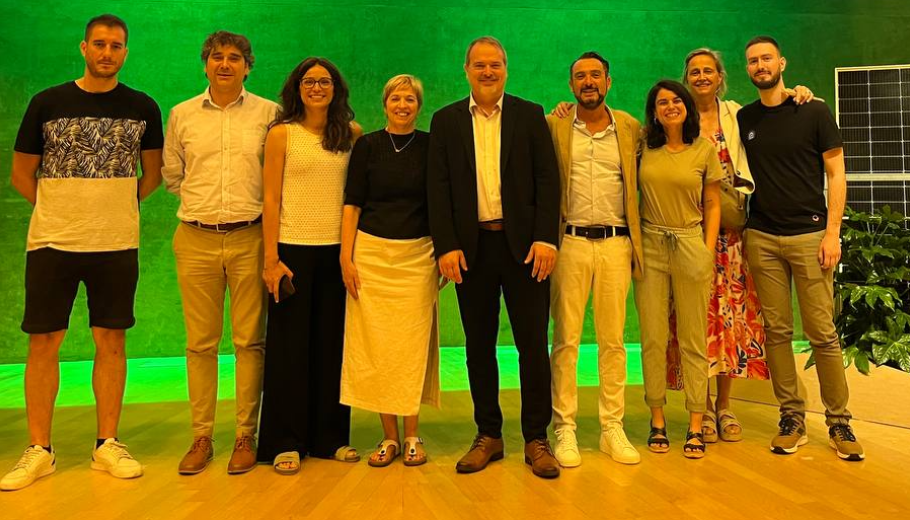ACCIÓN selects Suara Cooperativa as one of the ten benchmark Catalan companies in disruptive innovation for its Living Lab methodology, where it intercooperates to search for, develop, and test technological solutions to current social challenges.
ACCIÓN, the Agency for Business Competitiveness of the Generalitat de Catalunya, has awarded Suara Cooperativa this Wednesday the distinction of Catalonia Exponential Leader'24, which recognizes the ten Catalan companies that are benchmarks in the search for disruptive technological solutions.
In this fourth edition, more than 200 companies were presented and, subsequently, 30 were selected to participate in a BootCamp. Finally, this July 17, in an official event, where the Minister of Enterprise and Labor, Roger Torrent, participated, the 10 selected companies were announced.
Jordi Picas, Director of Innovation at Suara Cooperativa, is satisfied with this recognition that rewards the organization's commitment to innovation. "At Suara Cooperativa, we set ourselves the goal of offering responses based on social innovation and disruptive technology to the different challenges that we were encountering in the services where we attend to people of all ages, especially those in vulnerable situations."
Suara, the only cooperative awarded in the four editions that have been carried out, works in the field of social action, so it aims to offer disruptive technological solutions to different social challenges such as guaranteeing a dignified aging, ensuring the well-being of both workers and people attended to, as well as accompanying people with mental health disorders or in a process of cognitive decline. As a result of its commitment to innovation, Suara Cooperativa decided to create the Social Digital Lab, a social innovation laboratory that aims to intercooperate in the search, design, implementation, and testing of disruptive solutions. Precisely, this work methodology is what ACCIÓN has valued when selecting Suara as Catalonia Exponential Leader'24.
The quadruple helix model
The Social Digital Lab, which follows the methodology of European Living Labs, works with a quadruple helix model where companies and start-ups from the technology sector, universities and research institutes, the administration and citizens work together to search, design and implement technological solutions to the main social challenges. Another key element is that these technologies are tested in real environments to check their effectiveness.
One of the advantages of Suara Cooperativa is that through the workers or people attended to in the services it manages, it can detect the existing challenges in the different vital stages. This allows exploring responses according to the challenges of each of the services and that adapt to the needs of the people who are accompanied. Once a technological solution has been designed, the organization carries out different pilot tests in its services to check its effectiveness or if there are aspects to improve. "In this way we guarantee that the technologies we implement are really effective, that is, they respond to the real needs of the people attended to, as well as the professionals," assures Picas.
The use of immersive and virtual reality
During the covid-19 pandemic, Suara acquired the immersive reality tool from the Barcelona start-up Broomx to be able to offer relaxation or mindfulness sessions to workers. Four years later, it has continued to develop and improve this technology to offer therapeutic support to people with very diverse profiles: children or adolescents who have experienced traumatic episodes; adults in situations of stress or anxiety; or older people in a process of cognitive decline due to aging, among others. For example, REVIVE, a multimodal service aimed at older people developed by the Consorci Sanitari de Terrassa, has the objective of working on cognitive stimulation through accompaniment in an immersive environment. It has already reached more than a hundred people attended to in the cooperative's services. "Controlled and safe environments are created where the people who participate can work with proven techniques on their mental health problems, which makes it possible to increase the effectiveness of treatments and accelerate recovery," emphasizes Bárbara Outeiro, Head of Open Innovation at Suara Cooperativa.
This is not the only example of disruptive technology. The Social Digital Lab has finalized this July a pilot test with a hundred older people at home in L'Hospitalet and in supervised housing in different services managed by Suara. The objective has been to work on cognitive stimulation and active aging through virtual reality. This technology, developed by ORO.



